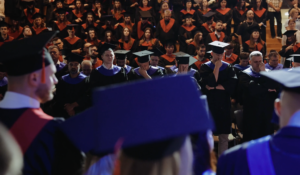
WASHINGTON (BP)–The U.S. Supreme Court agreed for the first time since a 1992 ruling to decide the constitutionality of prayers at public-school events by accepting a case involving invocations at football games.
The high court announced Nov. 15 it would review an opinion declaring as unconstitutional student prayers over the public-address system before high school football games. The Fifth U.S. Circuit Court of Appeals ruled the policy permitting this practice in a Galveston County, Texas, school district violated the First Amendment’s clause prohibiting a government establishment of religion. The prayers were illegal because they occurred at a school-sponsored event before a “government-organized audience,” a panel of the court wrote.
The Santa Fe Independent School District appealed the decision, arguing the establishment clause is not violated if students are able to offer religious speech in the same forum where nonreligious speech is permitted. It also said banning religious speech by students in the same forum where nonreligious speech is allowed would violate their free-speech rights.
As expected, church-state organizations split on the development.
“This is a pure free-speech case,” said Jay Sekulow, chief counsel of the American Center for Law and Justice, which specializes in religious liberty issues.
The court’s acceptance of the case “clearly puts the issue of student-led and student-initiated prayer squarely before the Supreme Court,” Sekulow said in a written release. “This is a critical free-speech case that has national implications in every school district in America.”
Barry Lynn, executive director of Americans United for Separation of Church and State, said he hoped the “justices don’t drop the ball by approving school-sanctioned religion.”
“Students should not be pressured to pray, whether it’s at football games, in the classroom or anywhere else,” Lynn said in a written release.
In the last decision by the high court concerning prayer at school events, the justices ruled in a 5-4 vote a school administration-organized, clergy-led prayer at a graduation ceremony was unconstitutional. That case, Lee v. Weisman, involved the prayer of a Jewish rabbi at a middle-school graduation.
The Supreme Court’s announcement it would hear the case followed by less than two weeks congressional adoption of a measure supporting prayers at high school football games. In a nonbinding resolution adopted in a voice vote without opposition, the House of Representatives said the practice should be upheld by the high court.
The dispute began in 1995 when the families of students in the district brought suit on the grounds prayers at school events violated the separation of church and state. The federal court ruled student-led prayers at football games and graduations were unconstitutional unless the students were instructed to deliver only “nonsectarian and nonproselytizing” messages or prayers.
The appeals court panel agreed graduation prayers were permissible if students were told to keep them “nonsectarian and nonproselytizing,” but it ruled student prayers were not permissible at other school-sponsored events.
In deciding to review the decision, the Supreme Court said it would limit its consideration to whether the school’s policy “permitting student-led, student-initiated prayer at football games violates the establishment clause.”
No date was scheduled for oral arguments in the case, which is Santa Fe Independent School District v. Doe.








